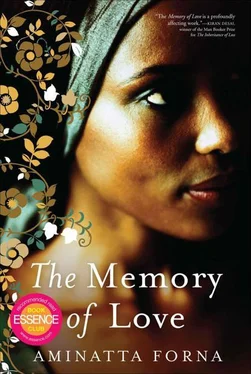‘You look good, Mary,’ he says.
‘Thank you.’ She is standing looking at him, her head on one side; the smile on her face is tinged with tenderness.
She knows, he thinks. She knows about Nenebah. And because he cannot bear the expression on her face, with all its pity, he says it first.
‘Ah, so you already know. Well, it will be good for her.’
There is firmness to her nod. She pulls a chair out, indicates for Kai to sit opposite her and claps her hands for the girl. ‘What will you have?’
‘Soda water,’ says Kai.
‘Nothing more?’
‘I’m in surgery later.’
‘Bring a soda water and a Guinness. Cold.’
They are silent while the girl opens the drinks, pours them, then places the bottles on the table and leaves.
‘Well,’ says Mary. ‘There’s no such thing as going back.’ She raises her glass to Kai, who clinks his against it.
‘No,’ says Kai. ‘Keep moving, isn’t that right?’ He takes a deep breath.
There is to be no hiding from Mary.
‘So anyway,’ she says. ‘Tell me your news. How come I’m getting to see so much of you?’
Perhaps he would not have told her if they hadn’t spoken of Nenebah, but now he feels differently. He tells her about his decision to leave, his appointment with Andrea Fernandez Mount.
When he’s finished speaking she says, ‘Well, you and Tejani never stopped talking about it. Remember me to him, won’t you? And since you’ve told me your big news, let me tell you mine.’ A pause. ‘I’m bringing my son back. I told my parents it is time. Enough. I want my two kids to live with me. Together. This one and that one.’ She pats her stomach and gives him a turned-down smile. ‘So it’s decided.’
Kai shakes his head. ‘I’m really pleased for you. How old is he now?’
‘A year the month after next. I want him back for his birthday.’
Half an hour later they say goodbye. People are beginning to arrive for lunch, Mary’s distraction grows and Kai stands up to leave. Her big belly bumps him again as she moves forward to embrace him. This time he cradles it in his hand, bends his head and presses his forehead against it, straightens and kisses Mary on the cheek. ‘You two take care of yourselves. I mean, you three .’ At the door he raises his hand and drops it. She has already turned away.
October 1999. So many children born in a single month. In Kai’s view Mary’s capacity to forgive seems, quite simply, immeasurable. Mary’s parents had taken her son away to raise in the village. Who knows how many children born in the same month in the same year are being raised all over the country like that? Children like Mary’s son who have one thing in common. They were all born nine months after the rebel army invaded the city.
Friday prayers and the streets are emptied of people. No poda podas , no taxis. A boy passes Kai pushing a load of jelly coconuts in a child’s pushchair. Kai stops him, buys one and waits while the boy hacks off the top then fashions a spoon for him out of the broken fragment. He stands scraping out pieces of coconut flesh and scooping them into his mouth, watching the people pass him on their way to the mosque. Three Fula money traders in long, pale djellebas and embroidered round hats. An elderly haja , white cloth wrapped around her head. A small group of office workers, heavy black shoes beneath their gowns. The boy stands watching Kai as intently as Kai watches the passers-by, as though he is watching a sideshow. The sun is beating down and Kai can feel the blood throb in the veins on his scalp.
He turns to his companion. ‘You want one?’
The boy’s eyes widen slightly, he nods sharply, neither speaking nor smiling, waiting to see what kind of joker Kai turns out to be. Kai hands him a coin. The boy takes it and serves himself one of his own coconuts, with all the care and delicacy he would a customer.
Somewhere, thinks Kai, there are towns and cities in a place called America. New York, Washington, San Francisco, Atlanta, Maryland.
He tries to imagine it, but this time he succeeds only in summoning images from films and advertisements. He cannot think how it will be, only that it is far away from all this.
In the final days of the invasion the rebels retreated from these streets. In their anger the residents discovered their courage and finally turned upon their oppressors. The doctors would sometimes leave the hospital to tour the city collecting corpses, issuing death certificates and stuffing the dead into the hospital mortuary. A vain effort at recordkeeping, imposing order on the unruliness of war. On this street Kai had seen a young girl, lying upon the road, angled in death. Fourteen, sixteen at most. Someone had tried to remove her clothing. She lay in the street in a scarlet bra and panties, doubtless at one time looted from an upmarket boutique. The people who lived there refused Kai and his team leave to touch the body. She’d been the commanding officer in charge of the attack. They would deny her the dignity of burial. The teenage commander, in stolen, silken underwear.
Kai stares at the spot where the girl had lain. Ripples of hot air rise from the tarmac. In the mirage he sees her, the brilliance of the underwear against the dark skin. He looks away. When he looks back the road is empty. The boy is watching him. Kai hands him the unfinished coconut and walks away.
The thing to remember, he tells himself, the thing to hold on to is this: that since he decided to leave he has been sleeping at night.
‘There will be a storm tonight, yes. I think so.’
Foday is the kind of patient the Western doctors complain no longer exists and for whom they yearn. He asks no questions and accepts whatever Kai tells him. Foday makes the foreign doctors nostalgic for the days before patient charters obliged them to shroud their work in secrecy and pronounce as little as possible. They like Africa. Africa is full of believers. Foday is a believer. Kai wishes Foday had a little less faith. He shifts Foday’s supper tray and leans his buttocks on the window ledge.
‘I know Mr Seligmann has already spoken to you, but I’m just reiterating what he said, so you’re clear. We’ll know more in a few weeks once the cast is off for good. You’ll have it changed in the meantime, we’ll shift the position of the foot so we can stretch that tendon. We’ll get an idea then, and of course, an even clearer picture once you begin physiotherapy. How does the foot feel now?’
‘It feels very well, thank you.’
It has something to do with gratitude, in Kai’s opinion, as though admitting to pain was somehow to demonstrate ungratefulness, and that in turn might jeopardise the doctors’ goodwill. The nurses seem equally to subscribe to the view that patients are undeserving, and are consequently reluctant to hand out as much as a single codeine tablet. Also because for years they’d had to guard precious supplies.
‘Ask the nurse for something if you feel any discomfort.’
‘I will do that, thank you.’
‘Good.’
‘Sometimes my leg itches,’ offers Foday, as though he has alighted upon a titbit to satisfy.
‘That’s normal. Try not to scratch it.’ Kai smiles. ‘How’s Zainab?’
‘Oh.’ Foday smiles in return. ‘Zainab has written to me again. My cousin brought the letter here yesterday. Now I feel sure she likes me.’
‘I’m certain she does,’ says Kai.
‘She says she’s travelling to the city, she would like to come and visit me.’
‘That’s good.’
‘Perhaps you would like to meet her? I’m sure she would like to meet you.’
‘I can’t think of anything I’d like more,’ says Kai.
‘Good. I am happy. And, Doctor?’
‘Yes?’
Читать дальше












